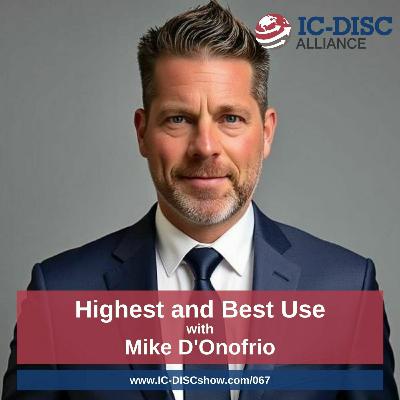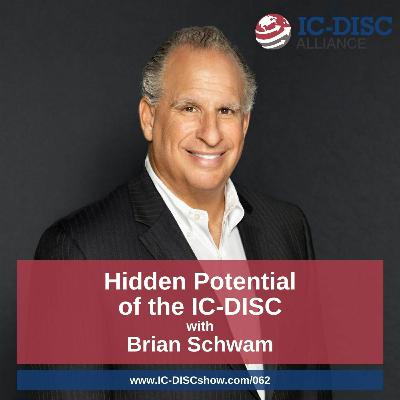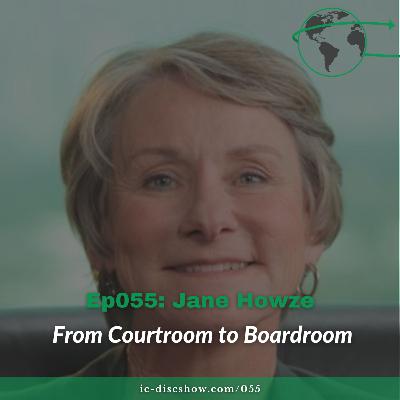Ep051: Pathways to Successful Business Transitions with Laurie Barkman
Description
Today on the IC-DISC show, join us for an insightful discussion with Laurie Barkman, a renowned CEO and author of The Business Transition Handbook. As the acclaimed Business Transition Sherpa, Laurie sheds light on the reality that all business owners will exit someday.
We explore the challenges of selling a business, like why most small businesses don't sell successfully and the potential pitfalls of an exit.
We also discuss relying on experienced advisors and how understanding taxes and markets can aid planning. Laurie shares invaluable advice on navigating this critical phase successfully.
This episode is a must-listen for any business owner planning to navigate their business transition.
<iframe width="560" height="315" src="https://www.youtube.com/embed/xTZVYC3Euq0?si=gMkG6Ay_i7YzgEUO" title="YouTube video player" frameborder="0" allow="accelerometer; autoplay; clipboard-write; encrypted-media; gyroscope; picture-in-picture; web-share" allowfullscreen></iframe>
SHOW HIGHLIGHTS
- Laurie and I discuss her journey as a CEO and author of The Business Transition Handbook, providing insights into the realities of business transition.
- She highlights the hard truth of selling a business and how eight out of ten small businesses fail to do so successfully.
- We talk about the common pitfalls of business transition, the five "D's" that can disrupt a business, and the value of creating a satisfied client base.
- Laurie explains the unique challenges law firms face during business transition and offers her strategies for a smooth transition.
- We delve into the importance of a clear exit plan and the different options business owners have when transitioning their business.
- Laurie advises focusing on three primary goals during business transition: business, personal, and financial.
- We discuss the analogy of business transition planning to having a sherpa guide you through a treacherous terrain, making the process seem less daunting.
- Laurie emphasizes the significance of accountability in business and the benefits of having industry expert conversations during transition.
- We explore the upcoming online course based on Laurie's book that she plans to launch in the first quarter of 2024, aiming to reach a wider audience of entrepreneurs.
- We discuss the importance of having an experienced network of professionals to help businesses reach their goals and create a successful transition plan.
LINKS
About The Business Transition Sherpa
About The Endgame Entrepreneurship Course
GUEST
TRANSCRIPT
(AI transcript provided as supporting material and may contain errors)
David: Hi, this is David Spray. Welcome to another episode of the IC Disc Show. My guest today is Laurie Barkman from Pittsburgh. Laurie is a really fun and interesting guest. She just released her first book entitled the Business Transition Handbook, and she is called in many circles the business transition, the idea being that a Sherpa guides somebody on a journey over a period of time rather than just a one-point event in time. Laurie has an impressive background as a former CEO of a large privately held company. She has a bachelor's and an MBA, and we talked about mistakes business owners make when they're transitioning their business. We talked about the sober reality that 100% every last business owner is going to exit their business and the question is will it be on their terms or someone else's? So there is some great advice and information for any company, any business owner who is looking to exit their business at some point, and I think you'll get a lot of value from this. Good morning, laurie. How are you today?
Laurie: David, hey, great to see you, I'm awesome.
David: That is great. Now, where are you located today?
Laurie: I'm in the great city of Pittsburgh, Pennsylvania.
David: Yes, now are you a native of Pittsburgh.
Laurie: I am not. I am not. I'm an adopted daughter of the city. I'm originally from Albany, New York.
David: Okay, so Ithaca wasn't too far to go for you.
Laurie: That's right, it was not. It was only about three hours away.
David: Okay, and then what brought you to Pittsburgh?
Laurie: After graduating from college, my husband and I moved around Pennsylvania with different corporations. I was with Aigner Sol Rand Company and I was with a division in Shippensburg and after four years decided to get my masters, get my MBA, and decided to move to Pittsburgh. My husband had gotten a nice job with McKinsey and company and here we are. Okay 25 years later.
David: You got your MBA in Pittsburgh, right at Carnegie.
Laurie: Mellon. I did at Carnegie Mellon okay.
David: Well, let's dig into this. So the business transition Sherpa. Where did this nickname come from? Did you come up with this yourself, or did somebody else give you that title?
Laurie: You know, it's kind of an amalgamation of things. I remember talking to my husband about a trip that he and I had taken in 1997. We did a trek, we did a hike, and this idea of somebody guiding you and stuck with me. And as I was thinking about what I'm doing, working with business owners, it's not just one moment in time, it's over a period of time, and I really feel like my role is to be a guide. I don't have all the answers. I have a path, I have tools and, just like a Sherpa and the great work that they do, it's that same idea is we're on a journey together. Entrepreneurs build their business, sometimes on their own, but most likely not. Entrepreneurs are building their companies with other people, and so when they get to this other side of the mountain, so to speak, and thinking about their next chapter, why would they go about that by themselves? And I want to be the person that helps guide them.
David: Yeah, I love the description of what you do because it picks up the fact that it's a journey, it's not a point in time and it's tough to do by yourself. In my experience I've just closely held small to medium sized business owners. Only sell a business once right, that's right.
Laurie: We can regret things in our experience. We can regret what we do and wish we did something differently, or we do not take an action and we regret not taking that action. And my book the whole reason I wrote the book the business transition handbook was to help people proactively so that they don't have regrets.
It's a very big, lofty goal to not have regrets in life, but if we can be proactive and we can understand what it takes to build a more valuable, transferable business and then understand what resources we might want to have on our side. I like to say, David, you can't do exit planning when you're exiting. It's just too late. So if you give yourself a time and space to work on having a more valuable, transferable business, the good news is that it's going to be a lot more fun to run your company. It's going to have an economic benefit to you and then in the future you'll have more options. You'll have more valuable options too.
David: Yeah, I really enjoyed reading your book. In fact, behind you there, I believe, there's a blown up cover. Yes, it is.
Laurie: That's right. Yeah, it was really interesting to write the book. I guess I could say it's my first book. I don't know that I'll have a second, but this, no matter what, is my first book and it was challenging, but at the same time, it was fun. It was like a giant puzzle.
Once I mapped out what I believe the big pitfalls are right. So the subtitle of the book is how to avoid succession pitfalls. Each chapter in the book and I don't know if you picked up on this as you were reading it but each chapter is a pitfall. What do you want to avoid? And so what I tried to do was put myself in the reader's seat, the entrepreneur's seat, and how I developed that perspective
























